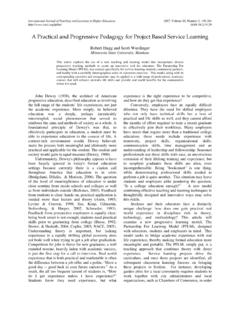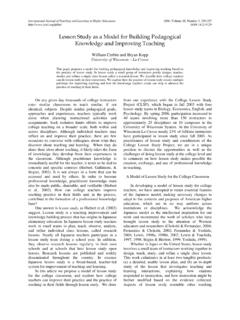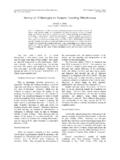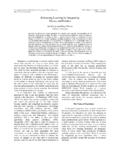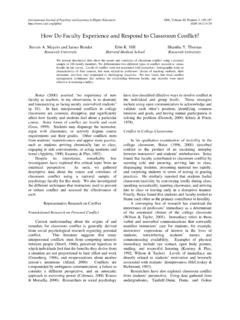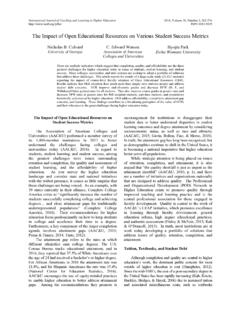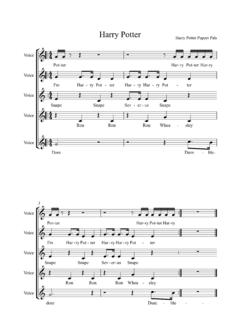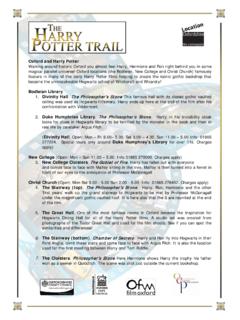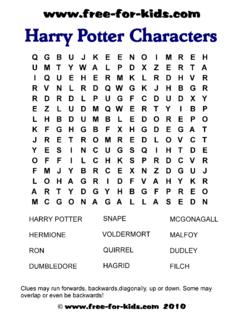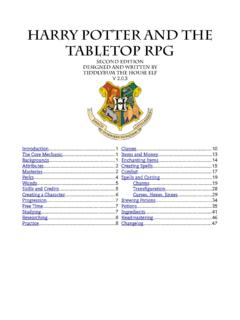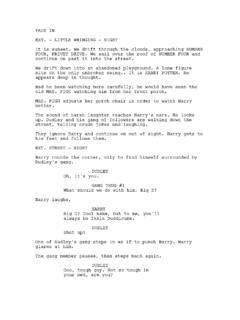Transcription of Harry Potter, Benjamin Bloom, and the Sociological …
1 International Journal of Teaching and Learning in Higher Education 2007, Volume 19, Number 2, 167-177 ISSN 1812-9129 Harry potter , Benjamin bloom , and the Sociological Imagination Joyce W. Fields Columbia College This paper is an examination of utilizing the Rowling Harry potter series as a teaching tool for introductory sociology courses. Because of the ease in comparing the Wizard culture in which Harry lives with their own culture, students apply critical thinking skills and thus increase their ability to think beyond their own, immediate social systems carrying them to stages three and four, application and analysis, in bloom s Taxonomy. Particular strengths of the Harry potter series are illustrations of Sociological theories and social processes; examples of social stratification; and explanations of basic Sociological concepts such as norms, sanctions, and deviance For this class, students are required to read the first two books or watch the movies adapted from these books.
2 In addition, they must read the third and fourth books in the series as the movie adaptations omit significant Sociological parallels. These books and movies increase abstract understanding of Sociological concepts as they apply to the fictional world of wizards. These abstractions become concrete as students apply this understanding to the analysis of their own place in their social environments. C. Wright Mills (1916-1962) wrote, The Sociological imagination enables us to grasp history and biography and the relations between the two within society. That is its task and its promise (Mills, 1959, p. 6). He further described social scientists as those who ask imaginative questions, seeking answers beyond the obvious, searching for the obscure, and the unexpected answer. In looking at the structure of any society he recommends three questions specifically aimed at jumpstarting this Sociological imagination.
3 These are: 1. What is the structure of this particular society as a whole? Its components and the relationship between components? What is the meaning of continuance or change? 2. Where does this society stand in human history? What does it contribute to the meaning of humanity? What are its essential feature and how do they differ from those of its past? 3. What varieties of men and women now prevail in this society and in this period? (Mills, 1959, p. 6-7). Beyond the scope of the classical definition of the Sociological imagination, Mills conveys a sense of what it means to be an intellectual who concentrates on the social nature of man and who seeks that which is significant (Elwell, 2002, slide 80). It is this task, to seek that which is significant as it defines man s relationships to others and social structures, that creates relevance in the classroom.
4 Schaefer (2002) introduces the Sociological imagination as an unusual type of creative allows us to comprehend the links between our immediate, personal social settings and the remote, impersonal social world that surrounds us and helps to shape us (p. 3). One key to using a Sociological imagination is the ability of viewing our own society as an outsider would. Divorcing self from the near (very well known and opinionated) environment is a difficult task for entry level undergraduate students. In 1956, Benjamin bloom published his taxonomy of learning behaviors. He addressed the order in which students attain, incorporate, and use knowledge. bloom outlines three domains in which education takes place. These are cognitive, affective, and psychomotor. The first or cognitive domain involves the development of the intellect or the way in which we gain and integrate knowledge and therefore, provides educators with a guide for educational planning and assessment.
5 The cognitive domain outlines six definitive stages or skill sets addressed in the educational process, each building on the one preceding it. Thus a student must first gain knowledge (be able to recall information) then progresses to comprehension (be able to interpret information). (S)he is then prepared for application (being able to apply information in a different context) and then moves to analysis (being able to distinguish between facts and inferences). The two most sophisticated cognitive skills are synthesis (being able to create a new meaning for the information) and evaluation (being able to make judgments about information and the way the information is used). Typically, introductory courses are offered to entry level students, either those who are coming to college directly from secondary schools (traditional students) or those coming at a later point in life (nontraditional students).
6 Typically, these students are at the Fields Harry potter 168 knowledge or comprehensive level of competence on bloom s Taxonomy of cognitive learning (1956). They can know the social structure of Harry s world and comprehend the underlying dynamics thereof, but the educator s goal is to provide a means for accessing more sophisticated learning through application and analysis. Through Sociological pedagogy and a fictional parallel world, students must become competent in applying their understanding and then analyzing this understanding in different contexts. The final course project, interpreting Harry potter through a theoretical lens, provides them with an opportunity to synthesize and evaluate. Not all introductory students are able to do this well early in their educational careers. Higher education is in the business of taking students from merely knowing to critical evaluation of that which they know.
7 Brookfield (1987) defines critical thinking as having four components, (a) identifying and challenging existing assumptions, (b) challenging the importance of context, (c) attempting to imagine and explore alternatives, and (d) exhibiting the resultant reflective skepticism, (p. 7-9). Integrating these concepts with bloom s Taxonomy allows a fleshed out continuum for teaching and learning. The critical thinking components exist on a progressive continuum such that a student must first know the existing assumptions ( bloom s level one and two, knowledge and comprehension) well enough to challenge these assumptions. ( bloom s level three, application). They then move toward understanding the importance of context in learning ( bloom s level four, analysis). These tasks are accomplished by combining fact and fiction as proposed in this course.
8 Context is primary in understanding and integrating Sociological thought into meaningful learning. Through a challenging final project, I provide students with the opportunity to imagine and explore alternatives ( bloom s level five, synthesis) and then to skeptically reflect on their original assumptions ( bloom s level six, evaluation). My job as an educator is to provide the experience and means by which my students can develop higher cognitive levels of learning. In this sense, Vygotsky would define me as a facilitator of learning. Brookfield s concept of critical thinking emerging on the bloom continuum raise questions about the how and when such learning takes place. Vygotsky s (1978) ideas regarding circular zones of proximal development tell us that learning takes place when the student is in such a zone and creates fertile opportunities for the teaching professional to model and lead students to critically think along the continuum.
9 Vygotsky reminds us that development is the internal process and learning is the external evidence of that process and that learning is most facilitated by example and social interaction. Harry and the instructor are partners in this quest. In Vygotsky s terms, Harry potter is the means whereby students observe development of another person and culture as the stories evolve and Harry and his friends move from childhood to adolescence. They become aware of the learning that takes place as Harry matures and evidences his unique position as a critical thinker. On another level, they learn about themselves as they develop insight into Harry s world, personality, and the interaction between the two. The very activity required for working though the potter series assumes truth in Vygotsky s reflection, What a child can do with assistance today she will be able to do by herself tomorrow (p.)
10 87). Application and analysis lead to higher order thinking and clear a path toward evaluation. Understanding the basic plot of the potter series underlies success in this process. Harry potter is orphaned as a baby when his wizard parents are killed defending him against the forces of the evil Lord Voldemort. Harry is taken to the home of his maternal aunt, Petunia Dursley, an intolerant, rather befuddled, nonwizard, and is raised in her very traditional British family without any awareness of his special status of the lone survivor of Voldemort s sophisticated magic. Indeed, he has no knowledge that he possesses any supernatural talent and is unaware of the parallel existence of a wizard world. Treated as a servant in the Dursley household, he longs for family and emotional connection when, close to his eleventh birthday, he is magically summoned to Hogwarts School of Witchcraft and Wizardry.
